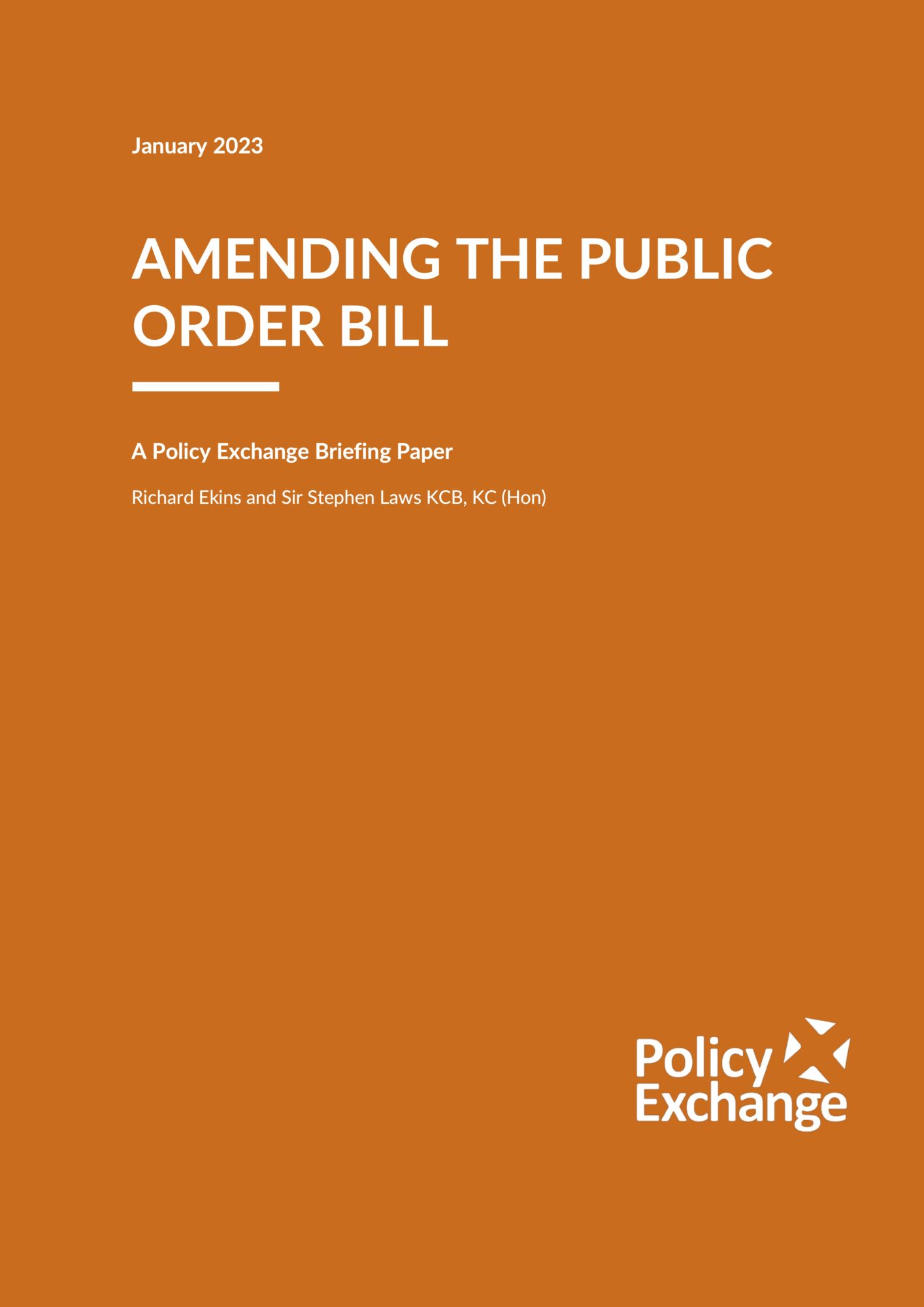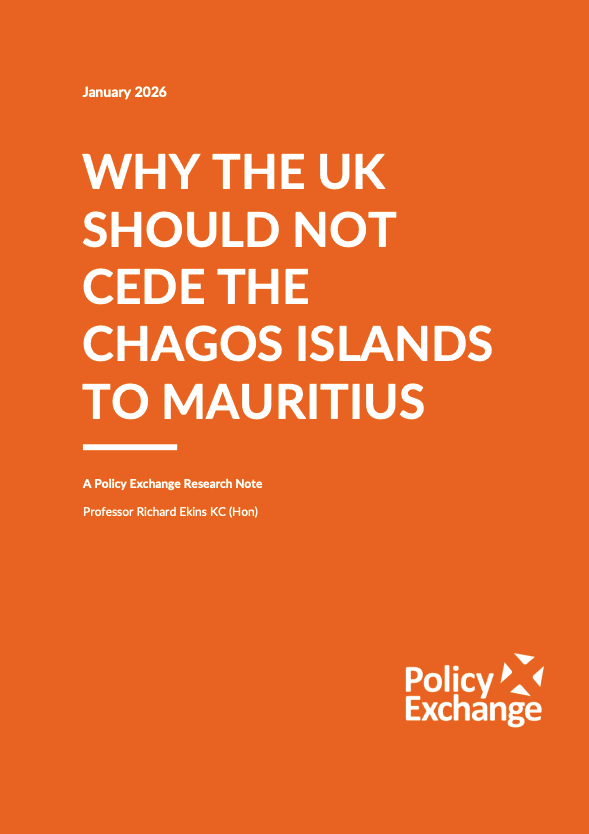Authors
Content
Amending the Public Order Bill
Introduction
The Public Order Bill is making its way through the House of Lords. The Report Stage will commence on 30 January, at which point the Bill is likely to be amended. This short note considers the amendments that the Government now supports or has itself introduced, analysing their likely effectiveness. The note then proposes two new amendments that we suggest would be more effective in restoring public order to our streets.
The new offences the Bill creates
The Bill creates a number of new offences including the offence of “locking on” (clause 1), or being equipped for locking on (clause 2), the offence of causing serious disruption by tunnelling (clause 3), or being present in a tunnel or equipped for tunnelling (clauses 4 and 5), the offence of obstruction of major transport works (clause 6), the offence of interference with the use or operation of key national infrastructure (clause 7), and the offence of interference with access to or provision of abortion services (clause 9). The Bill also makes provision for courts to make a serious disruption prevention order in relation to a person who has committed multiple protest-related offences or breached protest-related injunctions or caused or contributed to serious disruption (clauses 19-26). Breach of a serious disruption prevention order will itself be a criminal offence (clause 27).
Reasonable excuse and the Supreme Court’s Ziegler judgment
In striking contrast to clause 9, which is drawn very widely and makes no provision for “reasonable excuse”, the other offences in the Bill take pains to avoid criminalising any acts that might conceivably be thought to be reasonable acts of protest. Specifically, the offences only proscribe acts that cause, or are capable of causing, “serious disruption” and the clauses create a defence of “reasonable excuse” for acting thus. It is likely that the term “serious disruption” has been chosen partly in order to address the Supreme Court’s judgment in Ziegler,1Director of Public Prosecutions v Ziegler [2021] UKSC 23 which concerned section 137 of the Highways Act 1980, which makes it an offence for a person, without lawful authority or excuse, wilfully to obstruct free passage along the highway. The Supreme Court ruled that the exercise of the Convention rights to freedom of expression and freedom of assembly and association2Articles 10 and 11 of the European Convention of Human Rights (sometimes bundled together, not altogether accurately, as “the right to protest”) constituted lawful excuse, which meant that before a person may be convicted for obstructing the highway, the prosecution must prove that a conviction would be a proportionate (and thus justified) interference with that person’s Convention rights. The Ziegler judgment has caused very real difficulties for police in dealing with (environmental) protest and for judges attempting to run trials fairly and efficiently and to instruct juries about what must be proved.
The point of the offences the Bill introduces would seem to be to address some of the techniques deployed in recent environmental protest, but to do so in a way that anticipates the remarks by some Supreme Court judges in Ziegler to the effect that Convention rights require us to tolerate some disruption, but perhaps not “serious disruption”. Policy Exchange noted last year that the new offences in the Public Order Bill would be likely to prove unworkable in practice because they simply imported the question of Convention rights compliance.3P Stott, R Ekins and D Spencer, The ‘Just Stop Oil’ protests: A legal and policing quagmire (Policy Exchange, 4 November 2022), p.25 The “reasonable excuse” defence – which seems likely to be taken to be even wider than the “lawful excuse” defence in the Highways Act and other legislation – would permit defendants to argue that in locking on, or tunnelling, or obstructing major infrastructure works, they were exercising their Convention rights and that a conviction – or even arrest and prosecution – would be disproportionate. This would make it difficult for police to arrest or charge offenders and for courts to convict them.
The Hope/Faulks amendments: “serious disruption” and “reasonable excuse”
In December 2022, Lord Hope (former Supreme Court justice) and Lord Faulks KC (former Justice Minister) tabled amendments to the Bill that were intended to address these shortcomings. The first set of amendments (to clauses 1, 3 and 4) define “serious disruption”, providing that an act causes “serious disruption” if it prevents or hinders to more than a minor degree individuals or organisations from carrying out their daily activities. The second set of amendments (to clauses 1, 3, 4, 6 and 7) provide that the fact that the person acts as part of or in furtherance of protest on an issue of current debate will not constitute a “reasonable excuse”. On 16 January, the Government announced that it would support these amendments. On 24 January, the Government tabled two new clauses that would make similar amendments to section 137 of the Highways Act and to section 78 of the Police, Crime, Sentencing and Courts Act 2022 (public nuisance).
The amendments would improve the Bill. However, it is not clear that they will form an entirely effective response to the problems raised by the Ziegler case. Whatever legislative response is made to Ziegler will need to contradict the Supreme Court’s reasoning. The concepts that such legislation introduces will also need to be clear and incapable of being read down under section 3 of the Human Rights Act 1998, which requires Courts to interpret legislation as far as possible as compatible with Convention rights, and has resulted in surprising readings that impose judicial ideas of rights and proportionality in the face of clear legislative purpose and intent. Moreover, whatever else it does, the legislation in question also needs to be incapable of producing the same practical effect as Ziegler, which is to say the creation of a paralysing risk aversion in those policing protest. In addition, legislation will not deal adequately with the problems to which Ziegler has given rise unless it deals with all the relevant offences in which Ziegler is likely to arise.
The offences of locking on and tunnelling turn on “serious disruption”. The amendments moved by Lord Hope and Lord Faulks specify what constitutes “serious disruption”. This is not the best way in which to contradict the Ziegler judgment because the Supreme Court’s reasoning does not turn only on the distinction between serious disruption and other disruption. The amendments introduce new flexible concepts which are at risk of being read down, notably “minor degree” and “daily activities”. That is, the courts may deploy section 3 of the Human Rights Act to interpret these concepts so as to maximise the space for protest, permitting protestors to argue that while their actions might interfere with activities that might be described as “daily” in more than a minor degree in an ordinary sense, they should nonetheless not be understood to be seriously disruptive in terms of the legal meaning of this provision and each of its terms.
The second set of amendments aim to rule out any argument that protest constitutes “reasonable excuse”. The intent seems to be to specify that locking on, tunnelling and obstruction of major works (if causing serious disruption) can never be justified as lawful protest. The amendments’ focus on “protest on an issue of current debate” risks distraction. It is unclear why the nature or subject-matter of the protest should need to be specified in a way that would limit the circumstances in which the defence is to be qualified. In addition, section 3 of the Human Rights Act may be used to gloss the amended clauses so that they do not enable any conviction that in the court’s view would be a disproportionate interference with Articles 10 and 11. Such an interpretation might be reached by manipulating the scope of “serious disruption” or the meaning of “reasonable excuse”. No doubt, courts should accept that this set of amendments is intended to exclude an argument that locking on, tunnelling, obstructing major works can ever be a lawful exercise of Convention rights. But Parliamentary intent is not decisive under section 3 of the Human Rights Act, and it is far from clear that the courts will give full or sufficient effect to Parliament’s intentions in enacting the amended Bill.
Lord Hope and Lord Faulks’s amendments focus on the new offences the Bill creates, which is of course entirely reasonable. The Government has now, rightly, gone further and has tabled amendments to the Bill that would introduce two new clauses amending the offence of obstructing the highway and the offence of public nuisance. The Government’s newfound intention to reverse Ziegler is a welcome development, for which Policy Exchange has long argued. However, the legislative means the Government has adopted to this end is subject to the concerns noted above, in particular that the meaning of “serious disruption” remains uncertain and that human rights litigation may distort the clause’s meaning and application. We also note that aside from the offence of public nuisance, the Bill fails to reverse the extension of Ziegler to other existing offences, notably criminal damage (in the Attorney General’s reference from the Colston trial,4[2022] EWCA Crim 1259 the Court of Appeal has helpfully clarified the limits of any argument that a conviction would be disproportionate, but, less helpfully, leaves open the door to such an argument where “minor” criminal damage, or damage to public property rather than private property, is concerned).
Setting conditions on processions and assemblies
In addition to adopting and extending Lord Hope and Lord Faulks’s amendments, the Government intends to introduce two new clauses at Report Stage. The new clauses will amend sections 12 and 14 of the Public Order Act 1986, which make it possible for a senior police officer to set conditions on a public procession or public assembly when there is a risk of serious public disorder, serious damage to property, or serious disruption to the life of the community. The amendments enable the senior police officer to take into account the cumulative disruption to the life of the community that results from multiple processions or assemblies. The amendments also specify that serious disruption includes cases in which physical obstruction prevents, or hinders in a way that is more than minor, the carrying out of daily activities, including making a journey. The amendments change the existing statutory formulation of serious disruption by changing “significant delay” and “prolonged disruption” with “a delay that is more than minor” and “a disruption that is more than minor”.
These may be sensible changes, helpful on the margins. But they introduce further complexity into provisions that are already quite complex, the exercise of which is likely to be challenged in court, whether by way of ordinary judicial review or in the course of criminal trials when defence counsel attacks the validity of the relevant serious disruption order. More importantly still, these powers are useful only with advance notice about a planned procession or assembly. They are much less likely to be useful in the context of recent environmental protest, where groups of protestors obstruct the highway, or damage public or private property, without first signalling to the authorities their intentions. The provisions are, predictably, attacked as extensions of police power in relation to protest. Whatever the force of that argument, the provisions also fail directly to address public disorder of the type we have seen in recent years.
Two alternative amendments
The House of Lords should consider amendments that respond directly to the problems that the Ziegler case has created for police and trial courts. One possible amendment, which we call Option A, would reverse Ziegler only in relation to the offence of obstructing the highway:
(1) Section 137 of the Highways Act 1980 is amended as follows.
(2) After subsection (1C), insert –
“(1D) A person has no lawful excuse wilfully to obstruct free passage along a highway if the obstruction —
(a) is intended to intimidate, provoke, inconvenience or otherwise harm members of the public by interrupting or disrupting their freedom to use the highway or to carry on any other lawful activity; or
(b) is designed to influence the government or public opinion by subjecting any person, or their property, to a risk, or increased risk, of loss or damage.
(1E) It is immaterial that there are or may be other excuses or reasons for wilfully obstructing the highway or that the person’s main purpose may be different.
(1F) For the purposes of the Human Rights Act 1998, this section must be treated as necessary in a democratic society for the protection of the rights and freedoms of others.”
Option A would directly and precisely address the legal ruling in Ziegler and would anticipate and avoid any possible Human Rights Act argument, restoring the law that was undermined in Ziegler and that the police now so often have difficulty acting on. The advantage that Option A has over the Government’s proposed new clause, which clearly has a similar intention, is that it does not make criminal liability for obstructing the highway turn on the meaning of “serious disruption”, “daily activities”, or “protest on an issue of current debate” – and it is not vulnerable to human rights litigation.
Another possible amendment, which we term Option B, would reverse Ziegler in relation to all offences that include a lawful excuse requirement:
(1) This section applies to any offence that makes conduct unlawful unless there is an excuse for it and specifies either that the excuse must be a lawful excuse or that it must be a reasonable one.
(2) A person has no excuse for the conduct if—
(a) it is intended to intimidate, provoke, inconvenience or otherwise harm members of the public by interrupting or disrupting their freedom to carry on a lawful activity; or
(b) it is designed to influence the government or public opinion by subjecting any person, or their property, to a risk, or increased risk, of loss or damage.
(3) It is immaterial that there are or may be other excuses or reasons for the conduct or that its main purpose may be different.
(4) In this section “conduct” includes any act or omission;
(5) For the purposes of the Human Rights Act 1998, this section must be treated as necessary in a democratic society for the protection of the rights and freedoms of others.
This provision would extend to the offences the Bill creates (excluding clause 9, which concerns abortion and, strikingly, does not include a reasonable or lawful excuse defence). It would also include section 137 of the Highway Act 1980 and section 1 of the Criminal Damage Act 1971.
Clause 9: an unreasonable limit on peaceful protest
The offences the Bill creates are not made equal. Only one is sweeping, even draconian, in its criminalisation of protest, including protest that is peaceful and non-disruptive. That offence is clause 9, which concerns abortion. It imposes criminal liability on a person who, within 150m of an abortion clinic or any entry point to a building that contains such a clinic, “interferes with” any other person’s decision to access, provide or facilitate the provision of abortion services. The clause stipulates that “interferes with” includes not only threats and intimidation, but also attempts to advise, persuade or inform any person, or otherwise to express opinion or to seek to influence any person. As noted above, the clause does not include any defence that a person has a “lawful excuse” or “reasonable excuse” for their actions. The provision thus makes it a criminal offence to express opinion – which may be entirely peaceful and reasonable – in a public place, including on or adjacent to a public highway or any other open space to which the public has access, or indeed to any location visible from such a space. It seems that the provision is intended to be capable of being deployed to prosecute persons quietly praying or even silently standing vigil.
Predictably, while many human rights lawyers and international bodies have been outspoken in their criticism of the Bill, their concern has not been with this clause, which criminalises an unpopular minority group and makes sweeping limitations on freedoms of speech, assembly and religion. It is true that in a judgment given on 7 December last year,5REFERENCE by the Attorney General for Northern Ireland – Abortion Services (Safe Access Zones) (Northern Ireland) Bill [2022] UKSC 32 the Supreme Court rejected the Attorney General for Northern Ireland’s challenge to the lawfulness of analogous Northern Ireland legislation. The Attorney had argued that the Abortion Services (Safe Access Zones) (Northern Ireland) Bill fell outside the competence of the Assembly because it unjustifiably limited the freedoms bestowed by Articles 9-11 of the European Convention on Human Rights (freedoms of thought, conscience, religion, expression, assembly and association). The Supreme Court’s ruling settles the question of the Northern Ireland Assembly’s legislative competence but does not relieve members of the House of Lords (or Commons) of their responsibility to determine whether clause 9 makes adequate provision for freedoms of conscience, expression and assembly.
Lord Reed, President of the Supreme Court, is wrong to suggest, as he does in the final paragraphs of the Court’s judgment, that it would somehow be incoherent or perverse for the law to recognise the legal freedom of women to access abortion services and yet also to recognise the liberty of others to protest against abortion (in ways that do not amount to threats or intimidation) in the vicinity of an abortion clinic. On the contrary, most lawful protests are against lawful activities. The law should be very slow to criminalise the expression of opinion about lawful activity, including peaceful attempts to suggest to others that it could be wrong to exercise their legal freedoms or entitlements – and the lawfulness of those activities should not be used as a justification for criminalising protest about them. Parliamentarians should amend clause 9 to limit its scope to threats, intimidation and harassment.
Conclusion
If parliamentarians and the Government hope to restore public order they must reverse Ziegler, ending the state of affairs in which persons who obstruct the highway and (in some cases) damage property are able to evade conviction, and often also to delay or avoid arrest, by arguing that conviction would a disproportionate (unjustified) interference with their Convention rights. Lord Hope and Lord Faulks’s amendments go some way towards reversing this sorry state of affairs, as do the Government’s new clauses, which extend the same approach to the offence of obstructing the highway. But these amendments do not address the risk of human rights litigation undermining their intended meaning and effect. And in any case, their amendments do not address all the offences to which the Ziegler argument extends. Parliament should legislate specifically to reverse Ziegler. Accepting the Government’s new amendment would go some way to this end but Option A would be a more effective amendment of the Highways Act and Option B would be a better general solution. In this way, Parliament may take responsibility for specifying what acts of obstructive protest or campaigning are criminal wrongs.






